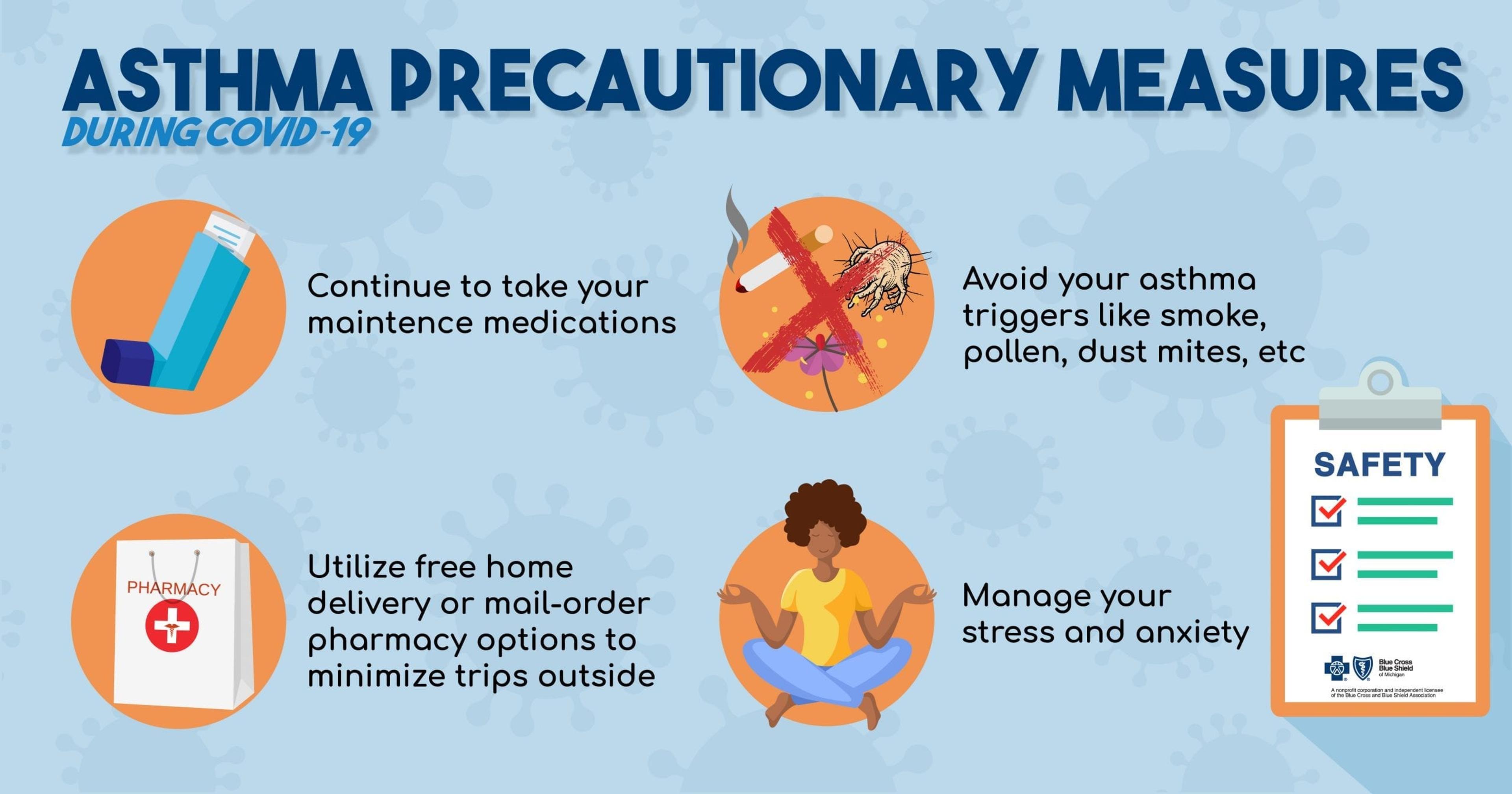People with Asthma Should Take Extra Precautions During COVID-19
Amy Barczy
| 4 min read
Amy Barczy is a former brand journalist who authored content at Blue Cross Blue Shield of Michigan. Prior to her time at Blue Cross from 2019-2024, she was a statewide news reporter for MLive.com. She has a decade of storytelling experience in local news media markets including Lansing, Grand Rapids, Holland, Ann Arbor and Port Huron.

Individuals that have moderate to severe asthma may be at a higher risk of a severe illness from the new coronavirus that causes COVID-19, according to officials with the U.S. Centers for Disease Control and Prevention. Therefore, it is of utmost importance to ensure you take your maintenance medications to keep your asthma under control. You can prevent the need to go to the hospital due to complications from your condition and protect yourself from COVID-19 complications that are more severe in patients with underlying medical conditions. As COVID-19 affects the respiratory tract – nose, throat and lungs – it can have a severe impact on people who already have asthma. Asthma is a chronic condition that affects more than 24 million people in the U.S. and causes the narrowing and swelling of the airways and the production of extra mucus. When a person with asthma encounters certain triggers – like smoke, pollen, dust mites, mold spores or exercise, for example – they could experience an asthma attack. Attacks usually entail difficulty breathing, wheezing, coughing and chest tightness, and can be deadly if not managed correctly. In individuals with asthma, COVID-19 can cause an asthma attack and could possibly lead to pneumonia and severe respiratory illness. That’s why individuals with asthma should take extra precautions to protect themselves against COVID-19, according to the CDC.

People with asthma should continue to take their maintenance medications as prescribed and consider steps to create an emergency supply of prescription medications like asthma inhalers. Many retail pharmacies are offering free home delivery or using a mail order pharmacy can be an option to ensure you have adequate supply of medications while minimizing trips outside the home. Avoid known asthma triggers, and make sure you’re managing your stress and anxiety. Here are some preventative steps the CDC recommends for individuals with underlying medical conditions:
- Stock up on supplies in case self-quarantine is necessary
- Keep space between yourself and others when performing essential errands in public like grocery shopping or picking up medication
- Stay away from others who are sick when in public, and avoid crowds
- Wash your hands often with soap and water, or using an alcohol-based hand sanitizer, before leaving the house and after you return
- Avoid cruise travel and any non-essential air travel
- If there is an outbreak in your community, stay at home as much as possible
- Have anyone who is sick in your home stay away from the rest of the household and use their own bathroom, if possible
- Don’t share personal items like cups or towels at home
- Keep a clean home by frequently disinfecting commonly touched surfaces like tables, doorknobs, light switches, countertops, handles, desks, phones, keyboards, toilets, faucets and sinks daily. However, understand which cleaning products may be triggers for your asthma and avoid them.
It’s important that people with asthma that don’t have COVID-19 continue to manage their condition as instructed by their doctor using controller inhalers and other medications as usual. Using your controller inhaler on a consistent basis will minimize the need to use your rescue inhaler as often by keeping your asthma under control. The symptoms of COVID-19 include fever, cough and shortness of breath; though symptoms may vary from patient to patient. Many patients have experienced typical cold or flu symptoms such as a sore or scratchy throat, aches and pains, headaches, fatigue, and even gastrointestinal symptoms. Increasing shortness of breath is a reason to seek medical assistance without delay. This information is current as of April 1, 2020. Blue Cross Blue Shield of Michigan is continuously monitoring information and recommendations as they are made by health authorities during the ongoing COVID-19 pandemic. Be assured that Blue Cross is closely monitoring all claims activity to ensure our members are not in jeopardy of running out of needed medications. This content has been reviewed and approved by Dr. S. George Kipa, deputy chief medical officer at Blue Cross Blue Shield of Michigan. More from MIBluesPerspectives:
- Why Medication Adherence is Important for People at a High Risk for COVID-19
- Top 5 Myths About Asthma
- Coronavirus Outbreak: What You Need to Know
Photo credit: MartinPrescott





